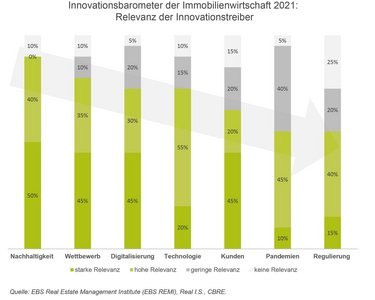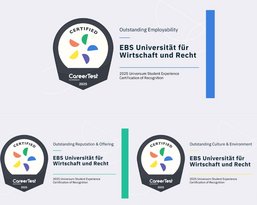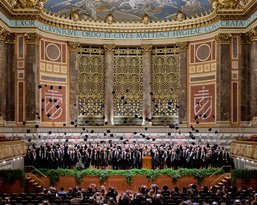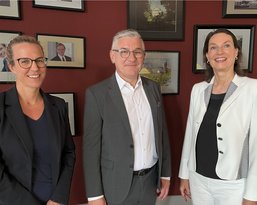
Study: ESG requirements are biggest driver of innovation
In the German real estate industry, sustainability is by far the most important innovation driver and will remain so in the coming decade.
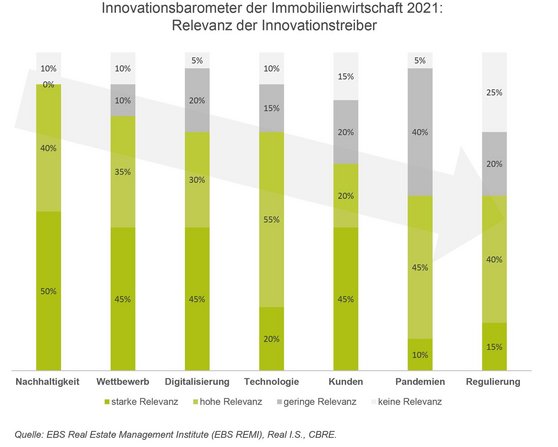
Building users are the driving force behind many innovations in the field of digitization and technology with the aim of achieving greater sustainability. This is one of the key findings of the "Innovation Barometer of the German Real Estate Industry 2021".
The study has been conducted annually since 2016 by the EBS Real Estate Management Institute of EBS University in cooperation with Real I.S. and CBRE. Within the framework of a quantitative as well as qualitative expert survey, the current transformation pressure and the associated necessity of innovations in the German real estate industry are examined in each case.
The current "Innovation Barometer" focuses for the first time on the "Creation - Real Estate" section of the real estate life cycle. This section includes the planning and design as well as the construction and realization of real estate projects; thus, the entire service spectrum of project development is taken into account.
Pandemic of little significance as a driver of innovation
Although the pandemic has unmistakably left its mark within the industry, the experts rated it as significantly less significant than other innovation drivers. Sustainability was given by far the greatest relevance - 90 percent of the experts rated it as medium or highly relevant. And this relevance will continue in the future, according to the experts. Accordingly, the aspect of sustainability will continue to be a key driver of innovation in 2031 and beyond, as will new technologies.
As expected, the survey results show that the innovation drivers digitization and competition are also attributed a strong significance. The moderate drivers customers and technology are currently in the midfield. With regard to the two least relevant drivers, pandemics and regulation, the picture was heterogeneous: around half of the respondents attributed high to strong relevance to the drivers, while the other half considered them to be of little to no relevance to their company.
"The innovation driver sustainability is closely interwoven with customers and users. The players in project development have a very high level of interest in the requirements and wishes of the tenants or users of the buildings. Therefore, in this area, it is the customers in particular who are bringing about the paradigm shift into a new era of sustainability. The results of a preparatory online questionnaire did not initially suggest such extraordinary importance. However, during the discussion in the expert workshop, the customer was highlighted as the driving force for a departure towards more sustainability," explains Prof. Dr. Kerstin Hennig, Head of the EBS Real Estate Management Institute.
"It is remarkable that currently not individual aspects such as customers or regulation are the decisive innovation drivers. Rather, sustainability is the key to innovation, which then manifests itself, for example, through customer preferences in the area of digitalization and technology in the context of EU regulatory changes aimed at making buildings more sustainable. The implementation of sustainability requirements leads to new work processes. Only in conjunction with the sustainability megatrend do the other innovation drivers investigated develop a high transformation pressure - and this in the area of the real estate industry where the trends of tomorrow are implemented," says Jochen Schenk, CEO of Real I.S. AG.
"There is a need for research, especially in terms of better understanding user and customer requirements - as has long been established in other industries. Although users obviously play a crucial role, there is currently too little viable information about their preferences and changes in preferences to respond to them effectively by developing innovative real estate products. According to the understanding of the participants, data collection and ¬ evaluation is currently too costly for a single actor. Data protection also poses challenges when collecting user data using sensor technology," explains Dr. Susanne Hügel, Head of Digital Strategy for Continental Europe at CBRE.
Smart building - but only in the service of sustainability
One example of the mutual interaction of the innovation drivers is so-called smart buildings, which are apparently not in great demand among customers at present. Instead, they increasingly want the "normal" building back. The drive from the customer's desire to implement digitization in the building in order to realize a smart building is therefore not fully given. However, if the aim of digitization or smart building technologies is to fulfill ESG requirements, this is also increasingly desired by users.
Technologies such as artificial intelligence (AI) are not yet very important, but they are on the rise. The experts share the view that there is considerable pent-up demand for AI, 3D printing and robotics in the real estate industry in general, but in the "creator" group in particular, and that these technologies are potentially key drivers of innovation. According to the experts, digitization will also change work processes in the "Creation - Real Estate" sector even more in the future.
Regulation of the rental market has a negative impact on pricing
Against the backdrop of the survey results, regulations currently appear to be rather inhibiting the development of innovative strategies. Instead, pressure from third parties, for example activists and publicly effective initiatives, shapes the perception of the real estate industry players surveyed and the measures they take. In this context, according to the experience of the experts interviewed, there are opportunities for innovation to be generated at certain levels of governance, for example through targeted financial support.
"The fact that the role of regulation in terms of its driving or inhibiting effect cannot be answered unequivocally is predominantly due to the multifaceted nature of this innovation driver. For example, a distinction must be made between the various legal levels from EU law to local building law, which can have different effects in driving innovation. Financial subsidies are also among the typical regulatory elements that can have a positive effect on innovation. The area of regulation should be looked at more intensively as an independent field of research, as this is where the key to more innovations in the necessary field of sustainability can be found," Prof. Dr. Hennig is convinced.
There are also many innovations in the study of the current transformation pressures on the real estate industry: In addition to the four previous innovation drivers (regulation, competition, technology, customers), three additional innovation drivers (sustainability, pandemics and digitalization) were included in the study design for the "Innovation Barometer of the German Real Estate Industry 2021". The need to consider additional drivers was verified in an exchange with science and practice partners.
Along the real estate lifecycle, the individual segments (creation - real estate, financing, service, investment) are now analyzed in a five-year rhythm. The focus group "Creation - Real Estate", for example, will then be considered again in 2025. By re-surveying the focus group, changes can be identified and analyzed in greater contrast to produce more distinguishable results. In 2022, the focus group "Financing" will be surveyed.
